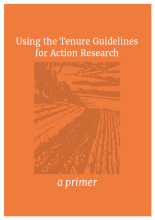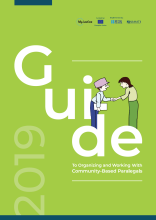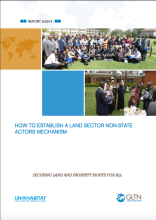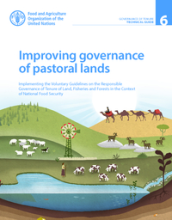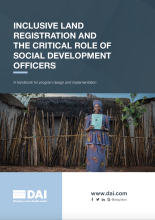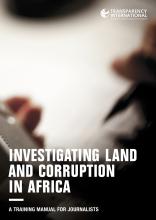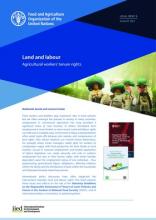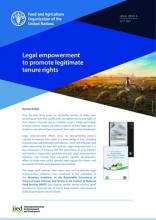Resources for Advocacy
Guide for grassroots movements on tenure bottom-up accountability
The purpose of the guide is to provide practical information to rural communities that they can use in framing and devising collective action and engagement strategies to strengthen their tenure of land, fisheries and forest and bring about bottom-up accountability.
Guide to Organizing and Working with Community-based Paralegals
This manual is a practical learning aid and helpful reference guide for community-based paralegals and organizations running community-based paralegal programs.
How to Establish a Land Sector Non-State Actors Mechanism
This guide outlines the factors that influence the set up and effective operation of a non-state actor mechanism in the land sector, particularly during a land reform process. A land sector non-state actor mechanism is a means by which a group of non-state actors (civil society, grassroots organisations, etc.) coordinates their interventions and support to enhance their impact in the land sector, particularly during land reform processes.
Improving Governance of Forest Tenure. A Practical Guide
This guide proposes tools and approaches to improve forest tenure governance and practical actions to realise this objective. It is intended for government policy-makers, or other public sector, private sector or civil society stakeholders concerned with forest governance and tenure reform.
Improving governance of pastoral lands - Implementing the Voluntary Guidelines on the Responsible Governance of Tenure of Land, Fisheries and Forests in the Context of National Food Security
The technical guide on improving the governance of pastoral lands is designed for several audiences including government and non-government actors. It covers specific challenges of pastoral tenure that are unique to pastoralism and considers how these different facets of pastoralist tenure (issues of the commons; free, prior and informed consent (FPIC); gender etc.) can be combined in a coherent approach to securing pastoral lands.
Improving transparency and accountability in the flow of benefits to mining communities
This report seeks to investigate and propose mechanisms that can be used to improve the flow of benefits to mining-affected communities. The report sets out what requirements should be met for a community trust (or similar legal vehicle) to offer protection of trust assets. It sets out recommendations on the manner in which the legal document should be crafted to protect communities, and proposes that the time is ripe for regulation and clarity. Although it is focused on South Africa, it will be relevant for countries facing similar challenges in the mining and other commercial sectors.
Inclusive Land Registration and the Critical Role of Social Development Officers
This guide identifies lessons learned and outlines critical steps that countries can apply to their own rural land administration programs as they strive to ensure these programs become more gender and socially inclusive. The document provides a valuable learning resource to help governments and communities implement inclusive land programs.
Investigating land and corruption in Africa - a training manual for journalists
The training manual provides a complete course for journalists – covering all aspects of researching, constructing, and presenting a land corruption story – which can be downloaded (for free) and used by trainers with or without prior experience of investigating land issues. It is intended for anyone that provides training or capacity-building for journalists including facilitators, trainers, lecturers and teachers.
Land and labour
Land and labour rights can intersect in multiple ways. Investments in large-scale plantations often entail trade-offs between job creation and compressions of land rights. Also, labour relations can involve tenure dimensions, for example where estate managers sublet plots for workers to complement wages with food production for their family or local markets.
Casual or seasonal employment and limited application of labour legislation can create precarity not only in workers’ employment but also in their tenure rights, with entire families dependent upon the employment status of one individual – thus perpetuating generational labour obligations, affecting relations within the family and the distribution of tasks within the household, and disproportionately impacting women. International policy discourses have often neglected these intersections.
Legal empowerment to promote legitimate tenure rights
Over the past 30 years, an increasing number of states have passed good laws that significantly strengthen the tenure rights of their citizens. However, due to multiple barriers, a high percentage of many nations’ citizens are either unaware of their legal rights or unable to use national laws to protect their rights when threatened.
Legal empowerment efforts focus on strengthening citizens’ capacity to exercise their rights in a wide variety of forums, including in government administrative procedures, courts and tribunals, and when advocating for laws and policies. Legal empowerment is a key component of ensuring that the governance of land, fisheries and forests is responsible, equitable and just. Legal empowerment initiatives may include legal education; capacity development; efforts to shape state justice systems; legal support for citizens; and promotion of citizen participation in law-making.


